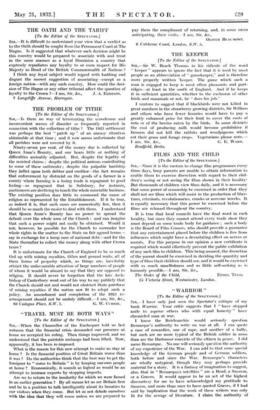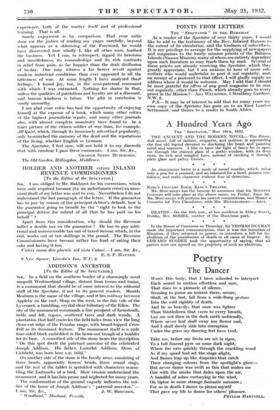" WARRIOR "
[To the Editor of the SPECTATOR.] Sin,—I have only just seen the Spectator's critique of my book Warrior. Your critic suggests that I " have stepped aside to asperse others who with equal honesty " have chronicled man at war.
I know the Reichsarchiv would seriously question Remarquc's authority to write on war at all. I can quote a case of cowardice, one of rape, and another of a bully. but such are no more typical of the British soldier in arms than are the Dartmoor convicts of the citizen in peace. I did name Remarque. No one will seriously question the authority of my experience of the War. I can add to that some special knowledge of the German people and of German soldiers, both before and since the War. Remarquc's characters are wholly untypical, though they may perhaps provide material for a story. It is a fantasy of imagination to suggest, also, that in " Remarque2s satellites " are a Read, a Sassoon, or a Graves. It would appear to be an act of the highest discourtesy for me to have acknowledged my gratitude to Sassoon, and more than once to have quoted Graves, if I had said by implication that the work of these writers was only fit for the sewage of literature. I claim the authority of
experience, both of the matter itself and of professional training. That is all.
Surely enjoyment is by comparison. Had your critic done me the justice of reading my pages carefully, beyond what appears as a skimming of the Foreword, he would have discovered how wholly I, like all other men, loathed the business. Yet I can, in retrospect, regard its heroisms and unselfishness, its comradeships and its rich contrasts in relief from pain, as far happier than the drab disillusion of to-day. One may witness a far fiercer revolt against modern industrial conditions than ever appeared in all the bitterness of war. At some length I have analysed these feelings. I found joy, too, in the semi-paternal command with which I was entrusted. Nothing for shame in that, unless the qualities of patriotism and loyalty are at a discount, and human kindness is taboo. The gibe in conclusion is surely unworthy.
I am glad your critic has had the opportunity of enjoying himself at the expense of a book, which many other critics of the highest journalistic repute, and many other journals also, with almost complete unanimity have found to be a truer picture of the citizen soldier at war than, for example, All Quiet, which, through its inunensely advertised popularity, only besmirched the memory of the dead and the reputations of the living, whether English or German.
The Spectator, I feel sure, will not hold it to my discredit that with candour I pass these comments.—I am, Sir, &c.,





































 Previous page
Previous page